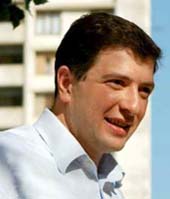Tbilisi residents to choose their own Mayor?
Monday, April 6

Ugulava said that he thinks both methods of electing the Tbilisi Mayor, direct or indirect, are democratic but in his personal opinion direct elections are better. “I’ll do my best to convince my colleagues of this. I have three reasons for preferring this method. First of all I’m sure that if our citizens were asked which way is better, 90% of them would say direct election. It is also a more transparent process and, most importantly, a wider range of candidates can participate. Of course I understand that for the Government this proposal bears some risk as Tbilisi is the country’s economic centre, but direct elections have always caused political disagreements, so I’m ready to starting work on them,” Ugulava said.
This initiative immediately became a matter of discussion for Parliamentary and non-Parliamentary opposition parties. Member of the Parliamentary minority Gia Tsagareishvili said that Ugulava’s new initiative was designed to create arguments among opposition members. The Government is doing its best to persuade even one opposition party to enter into dialogue with it, and if this happens it will fracture the unity of the opposition, he said. Tsagareishvili also doubts that this was Ugulava’s personal initiative, being sure it comes from the President. He added that the necessity of direct elections is so obvious that the Government should get down to creating this system as soon as possible rather than using the issue to manipulate people.
New Rights and Alliance for Georgia member Mamuka Katsitadze also regarded the suggestion as an attempt by the Government to draw the opposition into dialogue. “In general of course the Mayor should be directly elected but this can be done only after snap Presidential and Parliamentary elections. Voicing this initiative before April 9 is just funny,” he said.
Leader of Traditionalists and member of the Alliance for Freedom, Akaki Asatiani, said that obviously the Government is trying to calm the political situation just before the April 9 demonstrations. “An attempt to calm our politics down isn’t a bad thing but the main question is, can they manage this? There is a lot of time between now and 2010 and I don’t think this suggestion is important for society at this time,” Asatiani told Interpressnews.
Labour’s Giorgi Gugava also thinks that this initiative is an attempt to let the steam out of the strained political situation before the demonstrations. He also highlighted that there are many more important problems in the country at present than the way the Tbilisi Mayor is elected. “The Government thinks that the people are fools, or it is deliberately fooling itself by pretending not to see the real reason for the protests. The people are going to come out in the streets, not because of the way the Tbilisi Mayor is elected but to protest against the lost territories, the wrecked economy, the lack of justice and serious social and political problems. All these can’t be addressed by talking about direct Mayoral elections,” he added.
The most radical opposition comment on Ugulava’s statement came from Eka Beselia, member of the Movement for United Georgia. “In 2010 we will hold real elections by ourselves, so I want to advise the Government not to worry about this. Gigi Ugulava’s suggestion is another farce and it can’t be taken seriously”, Beselia said.
On the Rustavi 2 talk show Gigi Ugulava also highlighted that dialogue with the opposition is necessary and that all who say that it is already too late for any kind of dialogue are incorrect as “politics itself is the art of dialogue.” He added that before any elections changes must be made in the election code, but these should be the subject of negotiations between the opposing sides. The opposition mainly rejects any kind of dialogue on any issues, even about the direct election of the Tbilisi Mayor.
